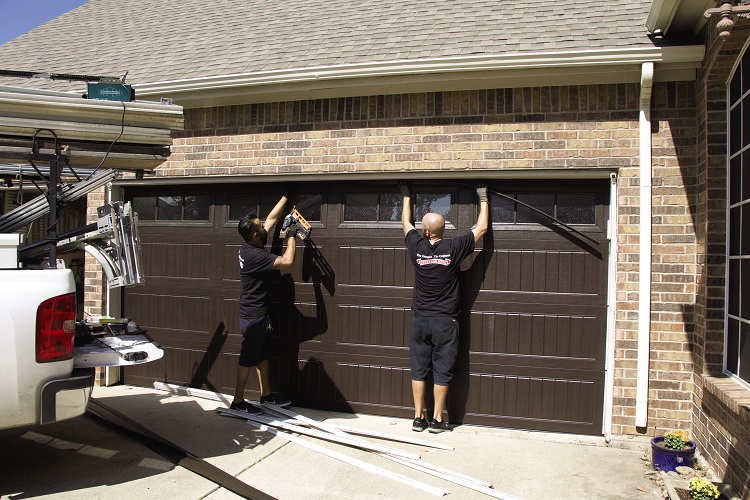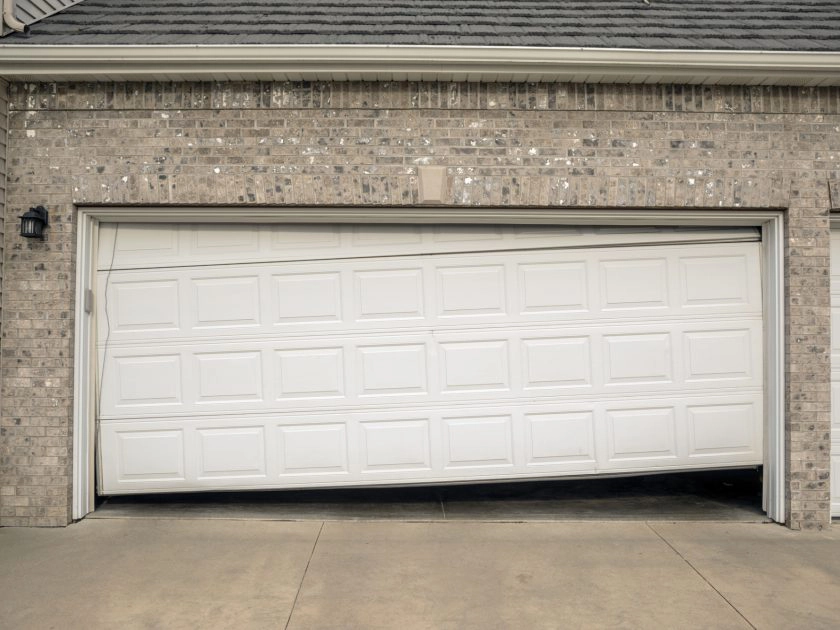Recognizing Typical Concerns That Affect Your Garage Door Performance
Comprehending the typical issues that can impede garage door capability is important for homeowners intending to guarantee both effectiveness and safety. Issues such as misaligned tracks, malfunctioning sensing units, and damaged springtimes can cause considerable operational difficulties. In addition, concerns like uncommon sounds or remote failures can suggest much deeper problems that call for prompt attention. By acquainting on your own with these prospective pitfalls, you can take aggressive steps to keep your garage door's reliability. The concern stays: what are the secret signs that signal an issue, and just how can they be successfully attended to?
Misaligned Tracks
Misaligned tracks represent a common issue that can considerably impede the functionality of a garage door. The tracks, which guide the door's activity, are vital to ensuring smooth operation. When these tracks end up being misaligned, they can cause the door to operate erratically, possibly causing jamming or total failure to shut or open up.
A number of aspects can contribute to track misalignment, including structural changes in the garage, wear and tear with time, or incorrect setup. Regular maintenance is vital to identify any kind of early indications of imbalance - Arizona Garage Door Services. Homeowners need to consistently examine the tracks for indicators of bending or obstruction, ensuring they are complimentary and clean from debris that can impede motion
If imbalance is suspected, it is suggested to attend to the problem without delay. Trying to force the door open or closed can exacerbate the issue, bring about more significant damage. In a lot of cases, straightening the tracks may need customized devices or know-how. For that reason, employing the aid of a certified garage door professional can ensure that the tracks are correctly aligned, recovering the door's functionality and improving safety and security while doing so.
Faulty Sensing Units
Defective sensing units can substantially impair the capability and safety and security of a garage door system. These sensors, usually located near the base of the door tracks, are designed to spot obstacles in the door's path, ensuring that the door reverses if something is in the means. When these sensing units breakdown, the door may fall short to run correctly, posturing a danger of injury or home damages.
Common issues related to defective sensors consist of misalignment, blockages, or electric failures. Misaligned sensors may not interact properly, resulting in the door falling short to open up or shut. Physical obstructions, such as dirt or particles, can also block the sensing unit's view, creating the system to misinterpret its environments. Additionally, electrical wiring issues or power supply issues can lead to the sensors not operating whatsoever.

Damaged Springs
Just how can homeowners identify when their garage door springs are harmed? Among the most noticeable signs is an imbalance in the door's procedure. If the garage door shows up to be irregular or does close or not open efficiently, the springs may be compromised. Property owners must observe the door's motion; if it struggles to lift or descends quickly, this might indicate a springtime concern.
One more indicator is a noticeable inspection of the springtimes themselves. Look for any kind of voids or breaks in the coils, along with rust or corrosion, which can compromise the springtimes with time. If the springtimes appear extended or lengthened, they may need substitute. Furthermore, unusual sounds during procedure, such as loud bangs or a significant jerking movement, can signify that the springtimes are falling short.
It's important to note that garage door springtimes are under tremendous stress, making them hazardous to manage without proper training. House owners ought find here to avoid trying repairs themselves and should contact an expert technician to evaluate the circumstance and carry out necessary substitutes. Timely focus to damaged springtimes is essential for keeping garage door functionality and making sure security.
Noisy Procedure
A garage door that operates noisily can be a source of annoyance for homeowners and may indicate underlying issues that call for focus. Loud operation can stem from several variables, including damaged rollers, loose equipment, or lack of lubrication.
Worn-out rollers are usually the primary perpetrator, as they can create grinding or rattling audios when the door closes and opens up (Arizona Garage Door Services). Metal rollers can use down with time, causing enhanced rubbing and sound. Changing these with nylon rollers can significantly reduce sound levels, as they often tend to run even more silently
Loosened hardware, such as bolts and nuts, can additionally add to a loud garage door. As the door moves, resonances can trigger these parts to rattle, creating undesirable sounds. Routine assessment and tightening up of these components can aid maintain a quieter operation.
In addition, a lack of lubrication on moving parts, including hinges and tracks, can click this link cause squealing or grinding noises. Using a silicone-based lubricant can minimize these sounds and extend the life expectancy of the components. Attending to these issues promptly can not only enhance the door's performance yet also boost the general peace of your home atmosphere.
Push-button Control Issues

First, guarantee that the remote's batteries are fresh and properly installed. Products like close-by wireless devices or even thick wall surfaces may hamper communication between the remote and the garage door opener.
If these actions do not solve the concern, consider reprogramming the remote. This process generally includes holding back certain switches on the remote and the garage door opener, following the producer's directions.
In many cases, the remote itself might be malfunctioning or damaged, requiring a replacement. Regular maintenance and prompt battery replacements can aid protect against remote problems and ensure smooth operation of your garage door, preserving the comfort that house owners anticipate.
Verdict
To conclude, maintaining garage door functionality requires caution in checking usual issues such as misaligned tracks, damaged sensors, and harmed springtimes. Resolving these troubles promptly can prevent operational failings and enhance safety. Furthermore, recognizing the importance of noisy procedure and remote control breakdowns is essential for guaranteeing reliable efficiency. Normal upkeep practices, including lubrication and detailed evaluations, function as effective measures in identifying and minimizing potential concerns, eventually promoting the durability and efficiency of garage doors.
Comprehending the common concerns that can impede garage door functionality is important for homeowners aiming to make sure both effectiveness and safety.Misaligned tracks stand for a common problem that can significantly prevent the performance of a garage door. Employing the help of a qualified garage door technician can guarantee that the tracks are properly straightened, bring back the door's performance and improving safety and security in the procedure.
These sensing units, usually located near the base of the door tracks, are designed to find challenges in the door's course, making sure that the door reverses if something is in the means (Arizona Garage Door Services).In conclusion, preserving garage door performance their website calls for caution in monitoring common issues such as misaligned tracks, malfunctioning sensing units, and damaged springs